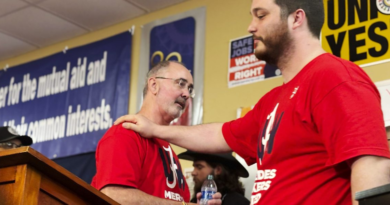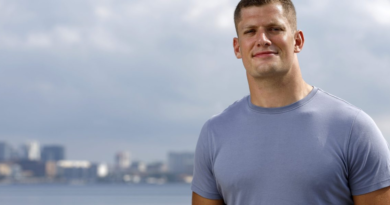Jersey Mike’s CEO is now worth almost as much as Mark Cuban after agreeing to sell his sandwich chain to Blackstone in a deal worth $8 billion
Jersey Mike’s CEO Peter Cancro has entered the club supreme—the billionaire’s club, that is.
The sub sandwich chain and buyout firm Blackstone are nearing a deal valuing Jersey Mike’s at about $8 billion, Reuters reported, launching Cancro into the list of the richest people in the world.
Jersey Mike’s Subs officially announced Tuesday it had reached an agreement in which private equity giant Blackstone would acquire majority ownership of the fast-casual sandwich chain, which has more than 3,000 locations. This makes Jersey Mike’s the second-largest sub chain in the U.S., behind Subway, which is reportedly worth up to $10 billion.
Cancro will maintain a “significant equity stake” and continue to lead the business, according to the announcement. The transaction is expected to be completed in early 2025.
Following the announcement, Cancro climbed the Bloomberg Billionaires Index, and is worth about $7.54 billion, according to the list. This ranks him close to Shark Tank star and serial investor Mark Cuban, who’s worth $7.86 billion; and hedge fund manager Bill Ackman, who’s worth $7.65 billion.
Jersey Mike’s didn’t immediately respond to Fortune’s request for comment.
Who is Peter Cancro?
Cancro has been with the company for more than 50 years. He started working at the company’s original Point Pleasant, N.J. location at age 14. At the time, the sandwich shop was called Mike’s Subs.
“I would sprinkle the subs as they came down the line, wrap them, and work the cash register,” Cancro wrote in a “How I Got Started” article published in Fortune in 2020. “I did everything, except I wasn’t old enough to work the slicer.”

Courtesy of Jersey Mike’s
Cancro made a whopping $1.75 per hour, “which was big money in 1971,” he wrote. But he started dreaming bigger when he learned the shop owner wanted to sell.
“One night my mother said, “Mike’s is for sale. Why don’t you buy it?” I laughed, went up one flight of stairs,” Cancro wrote. “By the time I reached the top, I decided to do it.”
To make it happen, Cancro tried knocking on people’s doors to raise money. After that proved unsuccessful, Cancro called up his football coach, Rod Smith, who also happened to be a banker.
“He knew me, and he said I always get the ball across the goal line,” Cancro wrote. “Back then, you shook hands, trusted people, and did business that way.”
In 1987, he started franchising units, and by the time the recession hit in 1991, the chain had 35 stores. But at the time, it was hard to borrow money.
“Everything we had made was spent on growth, advertising, and more people, and we overspent,” Cancro wrote. “We were negative a million and a half dollars and were counseled to declare bankruptcy, but I said no way.”

Photograph by Patrick James Miller for Fortune
And it’s a good thing that Cancro persevered. The chain gained back its momentum, hitting 100 stores by 1998. And although another recession hit in 2008 and 2009, there “was still some money to be lent,” Cancro recalled.
“Everyone was hit, but our company grew through it because we had enough stores open and had planned better for capital and growth,” he wrote.
Today, Jersey Mike’s is recognized as one of the fastest-growing fast-casual chains in America. This year, the sub chain ranked No. 2 on Entrepreneur’s Franchise 500. According to Entrepreneur, it costs up to $1.3 million to open a new Jersey Mike’s franchise location.
“We believe we are still in the early innings of Jersey Mike’s growth story and that Blackstone is the right partner to help us reach even greater heights,” Cancro said in a statement.
Cancro has also remained focused on philanthropic giving, having raised more than $113 million for local charities since 2011, according to Jersey Mike’s.
“What I love about being CEO is making a difference in people’s lives,” Cancro wrote. “Mostly I’m proudest of having coached all my kids’ sports teams. No matter how busy I was, I made it back for their practices. And they all got their first job at age 14.”




